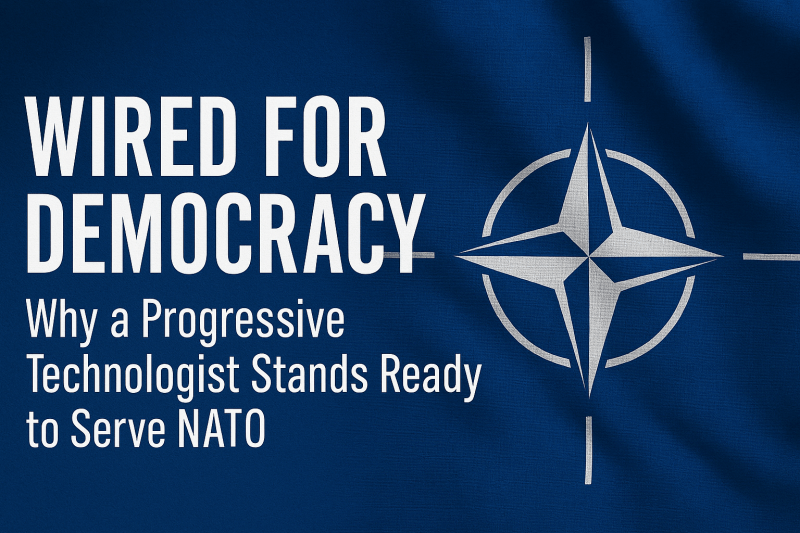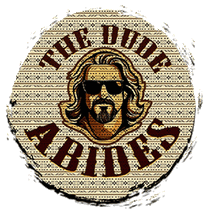
Wired for Democracy
Alright listen, I know what you’re thinking — “Wait, is this the same guy who sells anti-fascist t-shirts and writes sarcastic blog posts about tech, tyranny, and late-stage capitalism?” Yes. Yes it is.
But sometimes, even the most stubbornly independent-minded tech heads get the call to serve. Not in a corporate cubicle or a conference keynote, but for something real — like helping NATO keep democracy’s digital scaffolding from collapsing under the weight of trolls, fascists, and ransomware gangs.
So buckle up. This piece might read more like a mission brief than a meme dump, but don’t worry — the Dude hasn’t gone soft. Just focused. Because in a world on fire, someone’s gotta run the firewalls.
Wired for Democracy: Why a Progressive Technologist Stands Ready to Serve NATO
Introduction: Wired for Democracy
In an era defined by authoritarian resurgence, digital disinformation, and eroding democratic norms, the role of secure, resilient information infrastructure has never been more critical. As a seasoned IT security professional and lifelong advocate for liberal democratic values, I have devoted my career to protecting the connective tissue that binds modern societies: data, systems, and the trust they require. Today, I find myself increasingly drawn to the mission of NATO and its communications and cybersecurity operations—not only as a technologist but as a believer in the very principles that the Alliance exists to defend.
The Digital Frontline is Real
Cybersecurity isn’t theoretical. It’s not just malware signatures or vulnerability scans. It is the silent, invisible battlefield where adversaries seek to destabilize our institutions, compromise public trust, and fracture alliances. For the past seven years, I’ve worked in IT Operations roles supporting SOC and NOC teams—triaging security alerts, collaborating with analysts, and responding to real-time incidents across enterprise environments. What began as a hobby years earlier—tinkering with secure systems, building home lab networks, experimenting with firewall configs—became a vocation.
My day-to-day work includes assisting with vulnerability assessments, IAM architecture support, compliance framework alignment, and risk analysis. I’ve contributed to the development of GRC controls, integrated SIEM tooling, supported network and endpoint hardening, and helped organizations prepare for audits ranging from HIPAA to ISO 27001. These aren’t just technical requirements—they are the frameworks that ensure institutions can be resilient in the face of disruption.
A Progressive Technologist’s Ethos
I believe that technology is never neutral. It either enforces control or enables freedom. I align firmly with the latter. My values—transparency, accountability, privacy, equity—are what guide me in how I design, assess, and implement technology.
As liberal democratic nations come under increasing pressure, both from within and without, the digital domain becomes the first line of defense for freedom of speech, civic engagement, and individual privacy. I view cybersecurity not merely as a job, but as a civic responsibility.
From D-Day to Digital Defense: NATO’s Historical Gravity
NATO is not just a military alliance—it is a moral one. Born in the aftermath of World War II and forged in the fires of the Cold War, it stands as a testament to international cooperation in the face of tyranny. The echoes of June 6th, 1944 are not just historical—they are instructive.
The Allied landings in Normandy weren’t just a military operation; they were a global declaration that fascism would not go unanswered. NATO arose from that spirit—a collective commitment that aggression would be met with solidarity, that the defense of democracy was not the burden of one nation alone.
Today, those same values face new threats: not from tanks or U-boats, but from state-sponsored cyber units, AI-powered misinformation campaigns, and politically motivated sabotage of civilian infrastructure. NATO’s continued mission is as essential in 2025 as it was in 1949.
Dispelling the Myth: NATO Is Not Obsolete
It has become disturbingly fashionable in some corners of American political life to view NATO as a relic of a bygone era. This could not be further from the truth. Isolationism does not strengthen democracies—it fractures them.
Figures who idolize authoritarian leaders while disparaging NATO are not expressing strength; they are signaling surrender. Retreating from NATO would not restore American greatness. It would erase the very legacy that generations of Americans fought and died to secure.
My Alignment with NATO’s Mission
What draws me to the NATO Communications and Information Agency (NCIA) is not only its technical sophistication, but its moral clarity. The NCIA plays a vital role in enabling secure communications, protecting shared digital infrastructure, and ensuring operational continuity across borders. These are the same principles I have pursued in my own work—designing secure systems, facilitating cross-organizational compliance, and managing risk in high-stakes environments.
In my home lab, I continuously test and implement technologies ranging from federated identity systems to intrusion detection platforms. I run open-source VPNs, firewall stacks, and AI-assisted monitoring tools—not just for the sake of tinkering, but to explore new methods of resilience, decentralization, and rapid incident response. These experiments have translated into real-world results: faster detection, cleaner audit trails, and more robust endpoint defense.
Sidebar from the Dude: I know this sounds heavy, and it is — but I’m not writing this to impress suits in Belgium. I’m writing it because I believe in the mission. I’ve done the grunt work. I’ve triaged the alerts. I’ve stayed up patching systems while some Orange demagogue yells about pulling out of NATO on cable news. I’m not here to play hero. I’m here to do the work. And maybe crack a sarcastic smile while I do it.
America’s True Greatness Was Always Allied
To those who claim that "America First" means going it alone, I say this: America was at its greatest when it stood with others. From the Marshall Plan to Berlin Airlift, from Bosnia to Kabul, it was cooperation—not unilateralism—that defined strength.
Working with NATO is not about subservience. It’s about shared purpose. I believe that the greatness of the United States is best expressed not through dominance, but through alliance. Through contributing, not retreating.
The Silent War Is Already Here
The next global war may not begin with a missile strike. It may begin with the compromise of a power grid, the poisoning of an information feed, or the corruption of a civic database. NATO’s role in this new theater is indispensable, and I want to be part of that mission.
My background in risk analytics, data protection, and compliance-driven architecture makes me a strong fit for any team tasked with the defense of democracy’s digital frontier. I bring not only the technical knowledge, but the ideological commitment to carry it through.
Standing Ready to Serve
This blog post is not a resume, but it is a signal. I am prepared. I am willing. I am able. NATO is not just an international organization to me—it is a beacon of the principles I live by. If there is a place for an experienced, mission-driven IT security specialist within its ranks, then I stand ready to take it.
Postscript: Vigilance Is the Price of Liberty
Democracy doesn’t maintain itself. NATO doesn’t preserve peace by accident. It does so because people choose to stand up and serve. I want to be one of those people.
If you're reading this and you're involved in NATO recruitment or civilian support roles: know that I bring with me more than just technical credentials. I bring a belief that liberty must be defended not only by soldiers on the field, but by engineers behind terminals.
Let us not forget June 6, 1944. Let us not forget why NATO was formed. And let us not be complacent now.
I’m ready to build what defends us all.
Final Thoughts from the Dude:
If you're from NATO and you made it this far: respect. You’ve seen behind the curtain, and yep — I’m still standing here, fingers on the keys, firewall hot, coffee hotter.
And if you’re not from NATO, but you’re one of the folks who believe in democracy, mutual aid, and standing up when it counts — then maybe this post wasn’t just for recruiters. Maybe it was a rally cry for all of us who still believe that the internet doesn’t belong to fascists. That freedom needs sysadmins. And that defense doesn’t always wear a uniform — sometimes it wears a hoodie and knows a lot about zero trust architecture.
Peace, justice, and packet inspection,
The Dude
This post was written by an American cybersecurity professional with seven years of experience in IT Operations and security triage, and a lifelong passion for secure systems, privacy-first design, and international democratic cooperation. Based in the United States with strong internationalist values, they are actively seeking opportunities to support NATO's mission in the Netherlands or other allied regions.


